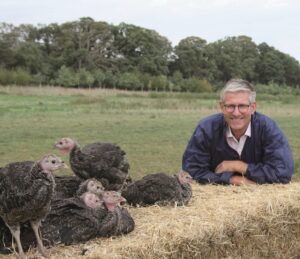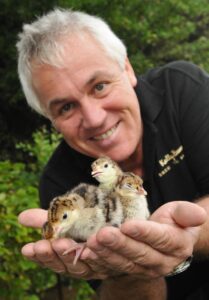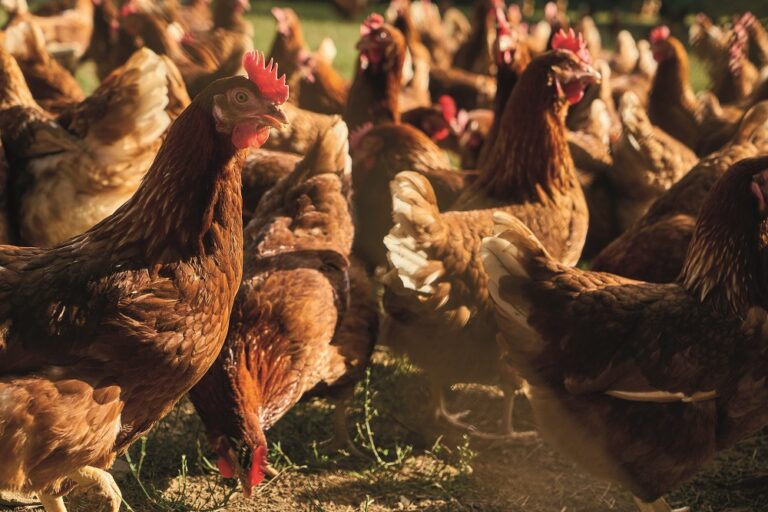Spring weather means the risk of avian influenza is starting to wane. But while the risk may be lessening for now, the lack of a vaccination programme means the industry still has no real tool to prevent it coming back year after year.
This year, the cases have been fewer than in the devastating 2022/23 season, but that does not mean the effects have been insignificant. In fact, the number of birds culled on the orders of APHA vets this season, around 1.8 million, is similar to that terrible winter in 2022/23 when there were a record 206 highly pathogenic cases.
This year, the case numbers have been lower, with 34 cases, but one single outbreak at Griffiths Family Farms’ Oakland site, led to the cull of its entire population of 1.4 million birds, and that loss has now led to the business taking the decision to permanently close its packing centre on the site. In addition, the loss of hen numbers has helped push up egg prices, which are around 20% higher now at retail than at the start of the year. The same is true in markets around the world. So bad is the impact in America that the rocketing price of eggs was discussed as part of the election campaign last year.
So, the pressure to protect poultry has never been greater. But despite this, vaccination is still off limits to UK producers, much to the enormous frustration of some producers.
Earlier this month, the avian influenza task force, formed after the 2022/23 season, issued its preliminary report. The task force is made up of industry and government representatives and was tasked with examining the case for and against vaccination commercial poultry. It examined issues such as the costs, the impacts on trade, and our veterinary capacity to administer such a programme.
It’s conclusions though, are lukewarm, recommending that while vaccination of poultry should be considered, there should be a continued emphasis on biosecurity measures.
While the UK prevaricates, other countries are moving ahead tentatively with vaccination.
The Netherlands has begun a pilot project to vaccinate poultry against avian influenza, with a trial taking place on one poultry farm. Dutch agriculture minister Femke Wiersma said government and the poultry sector were working together to make “large-scale vaccination possible step by step in a responsible manner.
“I am pleased that the poultry sector wants to take this step with me. Vaccination offers a huge opportunity to better control bird flu. With this pilot, we are taking an important step towards a responsible and large-scale deployment of vaccination.”
The aim of the pilot is to investigate how the market reacts to the sale of products from vaccinated poultry, while at the same time to gain experience with the implementation of the surveillance programme on the other. The government said its surveillance programme would ensure any infection on a vaccinated farm was quickly detected.
The pilot will run until the beginning of 2027 and will start on one poultry farm, with possible expansion to several farms. Chicks will be vaccinated in the hatchery and are then placed as laying hens on a laying farm. The eggs from these hens will be sold exclusively within the Netherlands, so that trade with third countries is not hindered.
France has also embraced vaccination for its high value duck sector.
So why not the UK?
Maire Burnett is technical director of the British Poultry Council. She recently spoke at the Northern Broiler Conference and said the BPC supported the “principles of vaccination policy but at the moment we can’t agree to it until we resolve the trade issues that would impact particularly on primary breeding.”
She added the cost of surveillance is an additional factor that does not make it cost efficient.
She talked about vaccination programmes in other markets, such as France, where despite the decision to vaccinate ducks, two cases have been confirmed in vaccinated ducks. She said the pilot study currently underway in the Netherlands in a flock of laying hens would feed into decision making in the UK.
Gary Ford, policy advisor for BFREPA, echoed these views. “At this point, vaccination is not yet a panacea,” he said. “Surveillance, for example, is arguably prohibitively expensive in its current form and.
“The taskforce statement also highlights other areas such as the potential impact on trade, developing an accredited DIVA test to differentiate infected birds from vaccinated birds and vaccine efficacy as areas that need to be developed and better understood. In addition, the impact on vaccine protection in flocks that are being kept longer on-farm needs to be fully understood given the inability to vaccinate in-lay.”
He said despite these challenges, BFREPA was “very supportive of the principal of vaccination as a key tool to protect our flocks against this invidious disease – alongside stringent biosecurity.”
Ford added though that currently, at the moment, vaccination was too expensive. The EU surveillance requirement for swabbing and testing immunised poultry flocks could potentially cost £1,000-£1,500 per shed per month. “The ‘bottom line’ financially is, given the estimated costs involved, particularly around surveillance, the cost/benefit analysis favours the current policy of stamping out and not vaccinating.
“Given that, we need to look very closely at those costs and to establish if there is a more cost-effective way of achieving the required level of surveillance that would satisfy all parties, government, industry and overseas trading partners.”
Producers’ view – “We are playing roulette with our industry. We need to vaccinate!”

Mark Gorton, managing director Norfolk Traditional Poultry
“Nothing seems to have changed in the last two seasons since the devastating 2022 outbreak. There was a massive effort during and after this to look at solutions, but it feels as if complacency has kicked in and resources seem to have been deployed elsewhere.
“We have to accept that the current strategy of AI disease control is not working. No professional and responsible poultry farmer would ever underestimate the need for tip top biosecurity and of course we need to keep a whole myriad of diseases out of our birds for their benefit and ours, not just AI, but this is not the solution and will never stamp this devastating disease out.
“AI is a worldwide problem and we need a worldwide solution. I accept that there are trade issues with vaccinated birds but if we don’t protect our birds, we won’t have any to trade, and I expect that any country we are trading with will have their own AI challenges.
“The frustration is that there are vaccines already there that have been shown to work in trials in other countries, but its legislation that is stopping us from using them in our flocks and this is what needs to change as it is this that’s making it too expensive to use – not the cost of the vaccine itself.
“I think there is also a massive moral issue here in that the current way to contain the disease is to cull everything out. We have to ask ourselves how many millions of birds need to be culled before we stop this disease? I dread to think how many birds have already been culled around the world, but I guess it is well into the 100s of millions maybe even billions. Think about it, this simply cannot be right and we need to stop this.
“I often use covid as a comparison in that when the disease first appeared we were all practising social distancing, wearing facemasks, hand sanitising, working from home etc, but this had little or no effect on the spread of the disease. The disease was only bought under control when we vaccinated everyone. AI is the same!
“The massive learnings in vaccine production during the pandemic can be used in the AI vaccine manufacture meaning that as the disease changes so can the vaccine – this wouldn’t have been possible pre pandemic!
“Finally, we have to remember that we already vaccinate our birds against lots of diseases such as Newcastle Disease, Mareks, and Gumboro, that have wreaked havoc on the industry and these diseases have been largely consigned to the history books. AI will be the same, but we have to get on with it and find solutions to the challenges that are preventing its use rather that reasons why we can’t use it.”
Paul Kelly, managing director, Kelly Turkeys

“The top line is AI is now endemic across most of the world and therefore just like Covid we need to vaccinate. We are not going to stamp the disease out, and the majority of veterinarians agree!
“We are between a rock and a hard place in that we have a compensation scheme that is not fit for purpose and yet we are not allowed to vaccinate.
“The reality is we are playing roulette with our poultry industry and are in the lap of the gods. For all we know we could be going into this winter simply holding our breath and praying we do not get wiped out. A ridiculous situation given there is a solution sitting on the shelf in vaccine bottles.
“Biosecurity is important and we can all try hard. But there is a big gap between theory and reality. Working farms will never eliminate risk and in many cases do not have the facilities or the skill set and training to implement excellent bio security and they never will.
“I know the wheels of government turns slowly but it has been three years of talking and researching and at the end of all this making the easy decision that trade barriers and costs of surveillance is too expensive. I do not agree for three reasons.
“1 – The broiler industry will not vaccinate to any great extent which I guess will be circa 80% of any surveillance costs. Only egg layers, broiler breeders and turkeys would vaccinate in my opinion. ie long life production
2/ Official veterinarians are not needed to take blood tests and there are perfectly competent labs that can test these bloods and do not need to go through the bureaucracy and cost of getting full accreditation. Growers or farmer would not want to do the surveillance on vaccinated flocks properly. It is in their interest to detect a field strain on any vaccinated flock early so it can be dealt with correctly.
3/ There are two precedents that have now been set. The French vaccinating their duck have negotiated with major trading countries that only product from vaccinated flocks cannot be exported. The Dutch have done a great piece of work in talking to their trading partners to explain they are trialling vaccination in laying hens and exports have been allowed to continue.
“We need to get the wheels of our government turning as quickly as the French and the Dutch. There is one very, very, very obvious initial step in the vaccination debate that is slapping us in the face. We need to vaccinate seasonal Christmas turkey production this year. Turkeys are the most susceptible to the disease and are the biggest risk to the UK poultry industry. We do not export our seasonal turkeys so no loss there.
“By vaccinating Christmas turkeys we will reduce the viral load and therefore risk to the rest of the industry. It is an absolute no brainer. Please APHA make a decision to help us all!”


